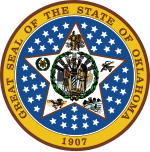| ||||||||||||||||||||||
Oklahoma Definition of Marriage Amendment | ||||||||||||||||||||||
| Results | ||||||||||||||||||||||
|---|---|---|---|---|---|---|---|---|---|---|---|---|---|---|---|---|---|---|---|---|---|---|
| ||||||||||||||||||||||
 Yes
80–90%
70–80%
60–70% | ||||||||||||||||||||||
| Sources: [1][2] | ||||||||||||||||||||||
| Elections in Oklahoma |
|---|
 |
|
|
Oklahoma Question 711[3] of 2004, was an amendment to the Oklahoma Constitution that defined marriage as the union of a man and a woman, thus rendering recognition or performance of same-sex marriages or civil unions null within the state prior to its being ruled unconstitutional. The referendum was approved by 76 percent of the voters.[4]
On January 14, 2014, Judge Terence C. Kern of the United States District Court for the Northern District of Oklahoma declared Question 711 unconstitutional. The case, Bishop v. United States (formerly Bishop v. Oklahoma), was then stayed pending appeal.[5] On July 18, 2014, the United States Court of Appeals for the Tenth Circuit ruled that Oklahoma's ban was unconstitutional.[6] On October 6, 2014, the Supreme Court of the United States rejected Oklahoma's request for review, overturning all state laws banning same-sex marriage.
- ^ OKLAHOMA STATE ELECTION BOARD ELECTION RESULTS 2004
- ^ VOTER REGISTRATION As of November 1, 2004
- ^ General Election, November 2, 2004, Summary Results Archived April 2, 2007, at the Wayback Machine, Oklahoma State Election Board. Accessed 22 December 2006.
- ^ CNN.com Election 2004 - Ballot Measures Accessed 30 November 2006.
- ^ Federal lawsuit renewed against Oklahoma's constitutional ban of same-sex marriage Accessed 11 December 2010
- ^ Bell, Kyle (July 18, 2014). "10th Circuit Appeals Court Strikes Down Oklahoma Gay Marriage Ban". South Bend Voice. Retrieved July 18, 2014.